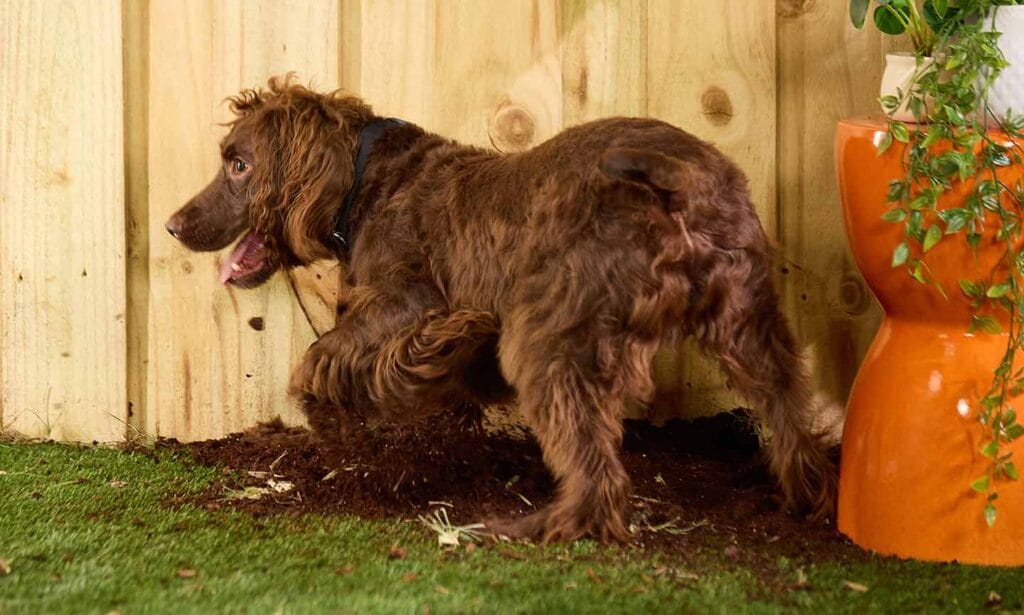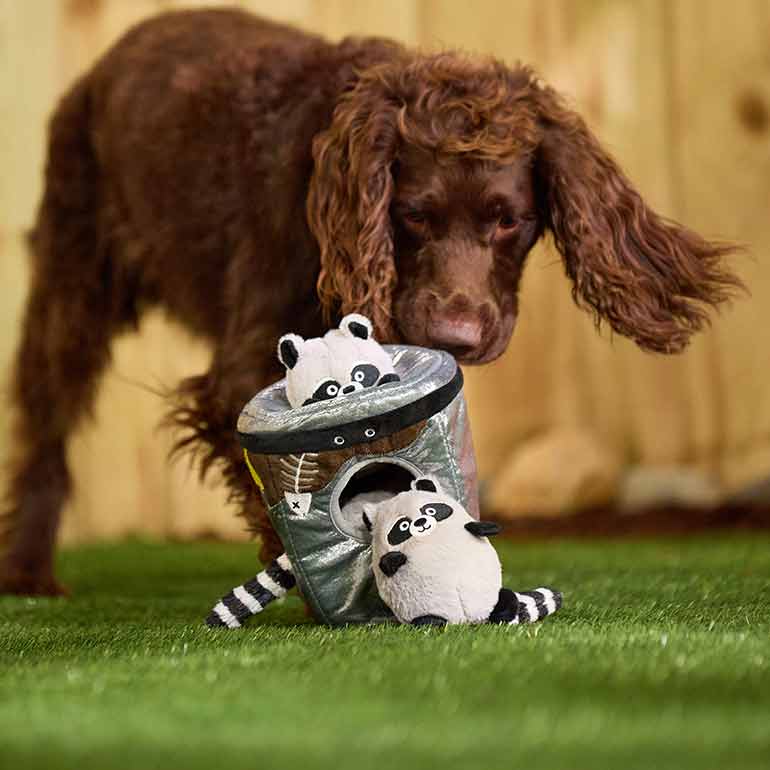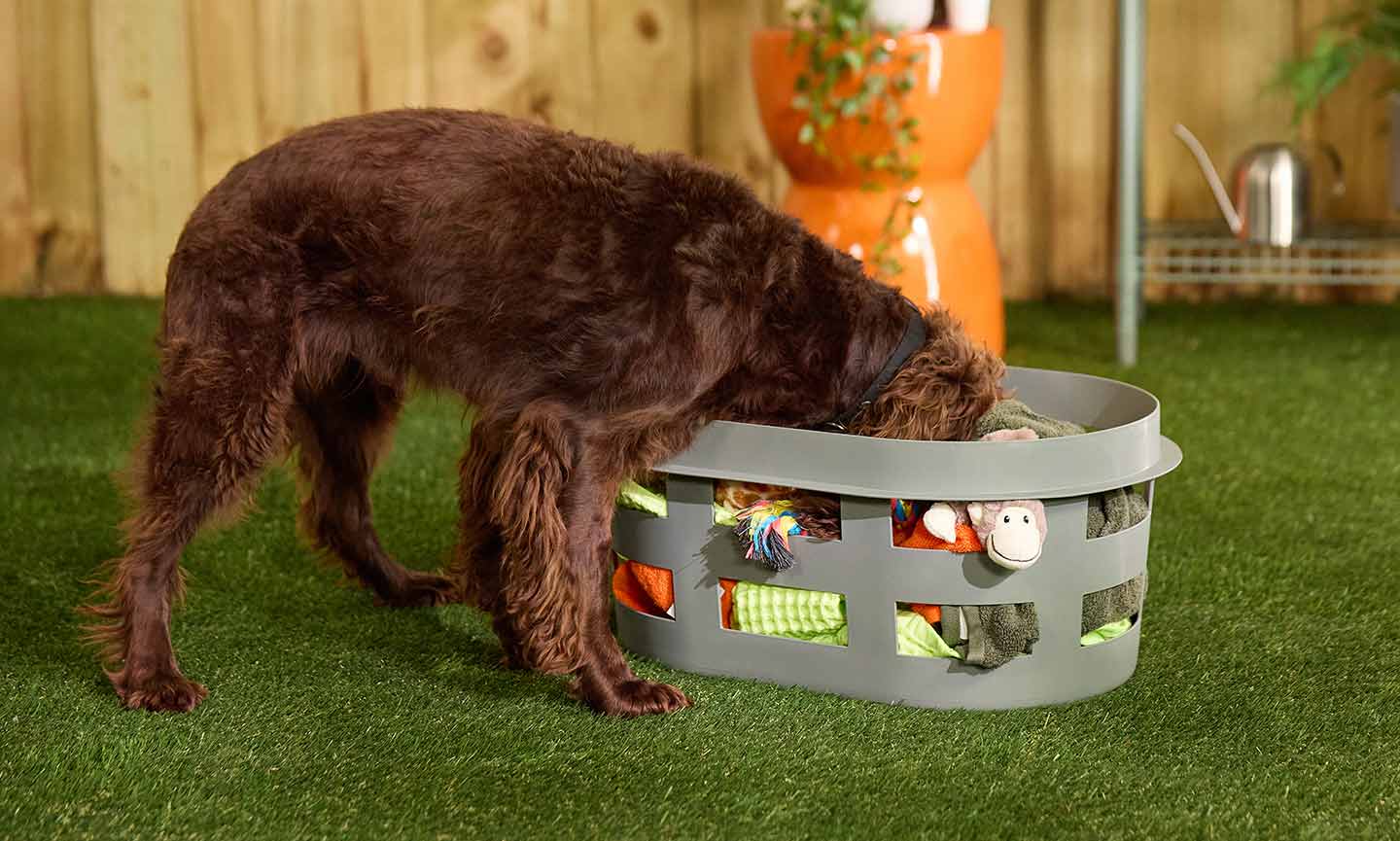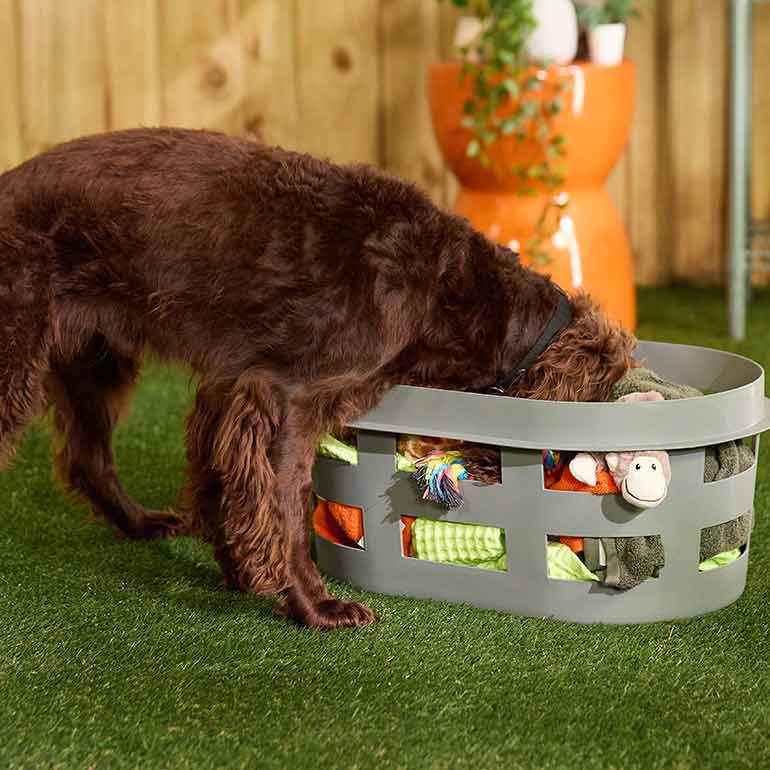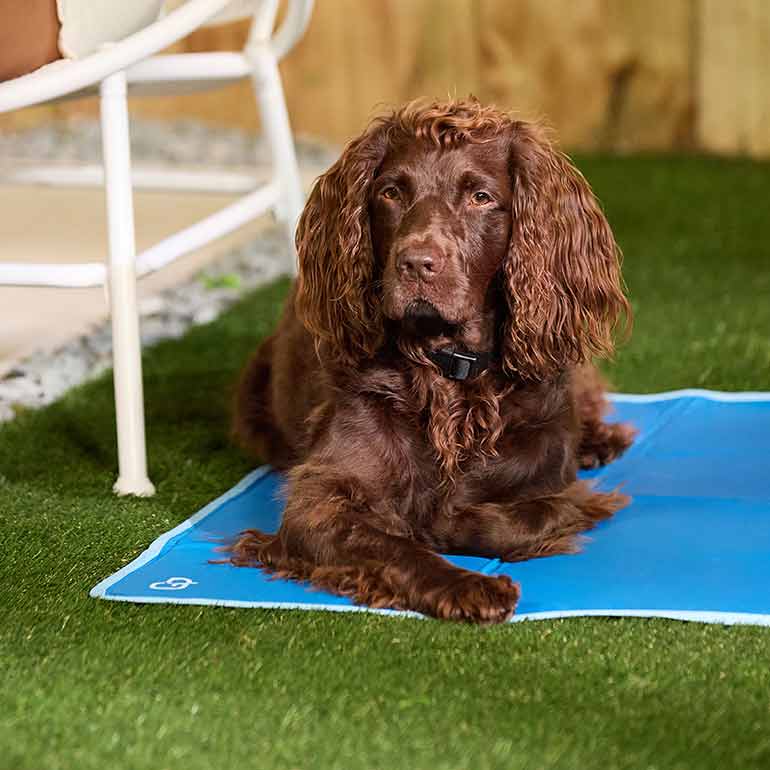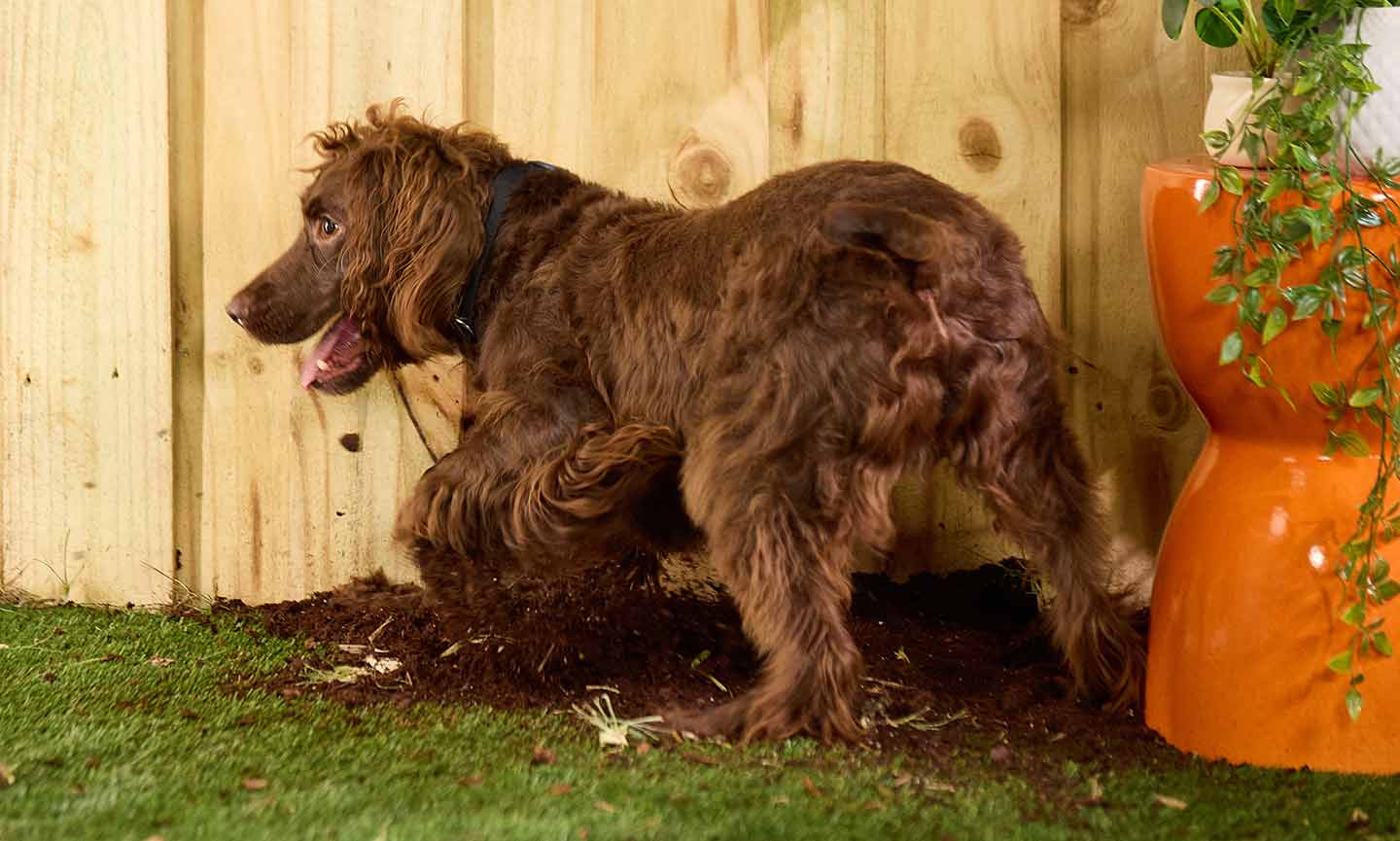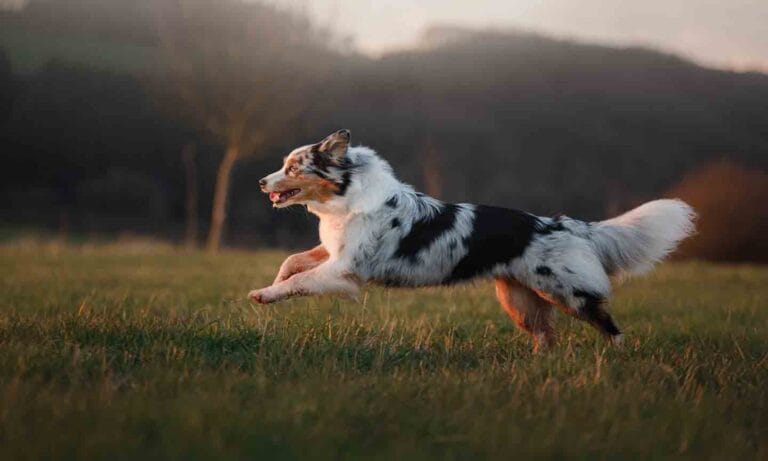With that in mind, it’s important for pet parents to learn how to stop a dog from digging holes. The key is to understand why your dog digs in the first place. From there, you can zero in on the issue and curb the behavior.
Why Do Dogs Dig?
Here’s the thing: There’s not just one reason why your dog has become the neighborhood champion of digging fine holes. Dogs dig for all sorts of reasons.
Amanda Farrah, dog trainer and behaviorist for Best Friends Animal Society based in Montrose, California, says that digging is an instinctual, species-specific behavior that all dogs do. In the past, dogs would dig holes as a way to provide protective shelter for themselves and their young, to cool down, and to hide away precious food that they didn’t want other animals to find.
Check out these 11 common reasons why dogs dig:
- Instinct: This instinctive dog behavior is present in current-day dogs, though it does tend to vary in intensity from breed to breed.
- Boredom: When pups get bored, they may dig holes to bide their time and get some physical and mental stimulation.
- Excess energy: Similarly, if your dog has a lot of pent-up energy to blow off, they may spend it digging to their heart's content. This is particularly common in dogs with naturally high energy levels.
- Anxiety: If your pup is prone to anxiety—or is experiencing an anxious situation such as hearing loud noises—they may try to cope via excessive digging, says Farrah. They may also dig holes when experiencing separation anxiety while you’re away for short or long periods.
- Prey drive: Dogs are natural born hunters, notes Amber Karwacki, DVM, veterinarian with Heart + Paw in Philadelphia, Pennsylvania. She says that if they sense critters under the ground, that’s a good enough reason to go digging for treasure.
- Trying to escape: Dogs may dig to escape from a confined space out of anxiety or because they’re simply curious about what’s on the other side of the fence. They’re naturally interested in new scents, scurrying critters, burrowing animals, and other dogs and cats.
- Hiding food or dog toys: “Some dogs may dig to bury or hide treasured items, such as toys, bones or food,” explains Alejandro Caos, DVM, veterinarian with The Vets in Miami, Florida. “This behavior is reminiscent of their ancestral scavenging instincts to store food for later consumption.”
- Attention-seeking: Your dog may act out by digging holes in order to earn your attention, especially if they are feeling bored, anxious, or lonely.
- Cooling down: In hot weather, dogs may dig a den to lay in the dirt, notes Dr. Karwacki. Freshly dug dirt is often much cooler compared to the ground’s surface and feels nice on a hot day!
- Breed trait: “Certain dog breeds have a higher tendency to dig due to their genetic predisposition,” notes Dr. Caos. “For example, terriers were historically bred for hunting vermin and digging them out from their burrows.”
- Enjoyment: Farrah notes that digging holes simply makes many dogs happy. Still, there are dog training techniques to modify or redirect their digging habit.
How To Stop a Dog From Digging Holes
1 Keep Your Pooch Busy
Dogs love a good nap just like any other animal, but many breeds require physical and mental stimulation throughout the day in order to feel their best.
“Dogs who aren’t getting either the level of engagement they need from their humans or who need a little more stimulating environment often revert to species-typical behaviors (like digging) to fight off this boredom,” explains Farrah.
Try adding more walks to their schedule, wearing them out with games of fetch or tug-of-war, and giving them mentally stimulating puzzle toys when you’re not around.
2 Address Their Anxiety
Anxious dogs often try to escape the yard, possibly to find you or to get away from what they consider dangerous. Dr. Karwacki says, “Talk to your veterinarian about medication and behavioral treatments to help with your dog's anxiety. Do not leave your dog unattended in the yard until the anxiety has improved.” You can also work with a dog trainer or behaviorist to help find solutions to your dog’s anxiety.
To further help with anxiety, she suggests trying a ThunderShirt® if your pup likes to wear clothes. She adds, “There are pheromone options, such as a calming diffuser or Adaptil® collar. These have calming pheromones for dogs which can help.” Another idea is to use food toys as distractions, such as a KONG® toy that has frozen peanut butter inside.
3 Provide Them With a Digging Zone
Farrah says, “Make your dog his own little dig pit with a low-sided tub or box full of old towels or toys. Hide his kibble or special treats inside and let him spend some time foraging for his food.” You can also build a sandbox for your pooch to use as a digging spot.
4 Get Rid of Vermin
5 Keep Them Cool When Outdoors
Dogs can easily overheat, so it’s important to keep them hydrated and as cool as possible whenever they’re spending time outdoors. To that end, it’s also important to monitor how long they’re spending outside, especially on hot days.
Dogs trying to cool down in the blazing heat will instinctively dig holes so they can lay in the cool dirt. “To help prevent this, keep your dogs inside on warmer days or, if they are outside, have a shaded area with water to help them stay cool,” Dr. Karwacki advises. Also make sure they have access to clean water.
6 Figure Out Why They’re Trying To Escape
If those aren’t options, making the yard more interesting by increasing enrichment opportunities might be helpful. For example, you can introduce a digging zone for them to dig as much as they want, or you can add interactive toys and games that keep them mentally stimulated.
Meanwhile, explore some ways to make the fence more secure, such as placing large rocks in areas they tend to dig or burying chicken wire at the base of your fence line.
Dog Breeds That Are Known Diggers
While every dog is unique, some breeds are more known for digging holes compared to others. If you own any of the following breeds—or are contemplating bringing one home—be aware that this might be an issue you’ll need to help them with.
- Terriers: “Many small terriers were bred to hunt small prey, sometimes digging right into their burrows,” says Farrah. This includes Jack Russell Terriers, Fox Terriers, Yorkshire Terriers, and Bull Terriers.
- Huskies and Malamutes: Dr. Caos says, “These Arctic working breeds have a strong instinct to dig and create shelter in snow or soil. They may dig to create a cool resting spot or to escape confinement.”
- Hounds: All dogs might dig to follow a scent, but hounds are particularly adept at this. This includes Dachshunds, Bloodhounds, Basset Hounds, and Coonhounds.
- Beagles: Beagles have a keen sense of smell and a very strong prey drive. They may dig in search of small animals or other scents they detect underground.
- Border Collies: Border Collies are known for excavating some pretty impressive holes. Dr. Caos says this is likely due to their high energy levels, which can cause them to go digging when they’re bored or have excess energy.
- Australian Shepherd: A member of the herding group, this breed also has a lot of energy and may go digging if they are not receiving proper physical and mental stimulation.
It's important to note that while these breeds may have a higher tendency to dig, individual dogs within any breed can vary in their behavior and preferences. “Proper training, socialization, and providing outlets for mental and physical exercise can help manage and redirect their digging instincts effectively,” Dr. Caos says.
Hopefully all the above information has given you a better understanding of why your pooch loves to dig, and what steps you can take to stop them from digging. If you’ve run out of options, consider enlisting your pup in some training classes with a dog trainer who can help tackle the issue once and for all. You might even be able to get your pup to stop burying their dog bones.
Expert input for this story provided by Amanda Farrah, dog trainer and behaviorist for Best Friends Animal Society based in Montrose, California; Amber Karwacki, DVM, veterinarian with Heart + Paw in Philadelphia, Pennsylvania; Alejandro Caos, DVM, veterinarian with The Vets in Miami, Florida.
This content was medically reviewed by a veterinarian.
More Picks for a Happy, Furry Home
Share:
